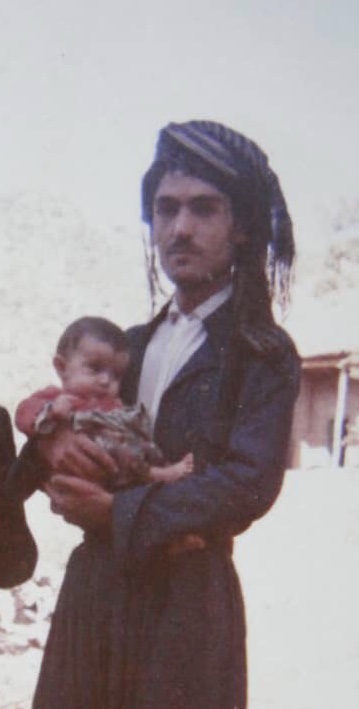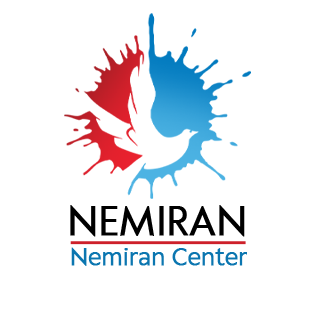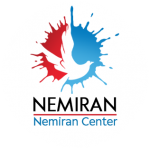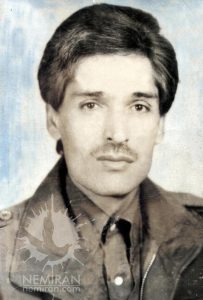
Mansour Ahmadi, the son of Mohammad Reza Beg Ney, was born in 1324 Iranian Calendar (1945) in Ney village of Marivan city. He was only two years old when his father, Mohammad Reza Beg, a well-known Kurdish patriot, was arrested by agents of the Shah’s regime. He was executed simultaneously with the execution of the Kurdish leader Qazi Mohammad in Mahabad, as well as the execution of several members of Faizullah Beigi’s family in Saqqez. He was deprived of his fatherly caress and love in his childhood. He finished elementary and middle school in Ney village and high school in Marivan. In his youth, he decided to oppose the monarchy oppressive regime with exemplary fervor and a sense of patriotism that, like his father, was rooted in him. He joined the liberation movement and secretly started his activities.
He was forced to leave his homeland and in 1342 he went to the south of Kurdistan (Iraqi Kurdistan) after the arrest of one of his comrades. During the two and a half years of his residence there, he became acquainted with the freedom movement in East Kurdistan (Iranian Kurdistan) and joined it. After returning to Iran, he surrendered to shah’s regime. He was sent to conscription. He soon realized that he couldn’t bear this compulsion. In 1345 Iranian Calendar (1946), he went to the south Kurdistan again and joined the Democratic Party of Iranian Kurdistan.
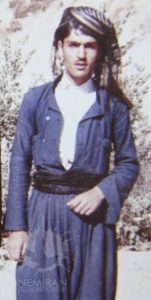
Mansour returned to his hometown in the last days of 1349 (1960) and settled in the city of Marivan. According to his compatriots, Mansour was committed to serving Kurdish people and the freedom of Kurdistan and devoted all his energy to this goal. The people of Marivan recalled him as a well-known, reliable and engaged person. After establishing the Islamic Republic, Mansour rejoined the ranks of the Democratic Party and secretly operated inside the city of Marivan. He was arrested by Marivan intelligence forces in 1360 (1981). He was released after eight months enduring the most brutal tortures because they could force him to confess. After his release, the repressive forces of the regime continued to threaten him and forced him to change his place of work several times. This pressure continued until 1370 (1991). In the meantime, the Marivan intelligence service, in cooperation with the Marivan governor’s office and the Sanandaj intelligence service planned his arrest. He was invited to Sanandaj to meet with the governor of Kurdistan. As he went there, he was arrested by the Sanandaj intelligence forces in the governor’s office.
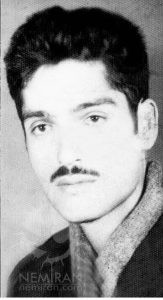
Mansour’s family had no information about his fate for four months. They were finally unofficially informed that Mansour had been taken to an underground intelligence prison, where he was banned from visiting for another year. After a year and family follow-up, they were allowed a short visit. They were forbidden to ask him any other question except greetings. But Mansour talked boldly about the brutal harassment and torture during the year. He also pointed out that this regime was not trustful and made clear that he will not cooperate with them. Mansour also said that the clerical regime had promised him a lot of financial help and a good job position as reward for cooperating with them. He also replied that he would never sell his dignity and freedom even for the sake of the whole government.
After enduring 16 months of captivity, enduring all kinds of torture and physical and mental harassment and rejecting the offer of cooperation with the Mullah regime, he fell into disgrace of theocrats. He was handed over to the death squads on 6/14/1371 (5/9/1992). This victim followed the path of immortals of Kurdistan. The barbarous clergy should know that the path of Mansour’s father and other martyrs of Kurdistan will continue on the path to freedom.
The innocent corpse of Mansour Ahmadi was secretly buried in Behesht Mohammadi Cemetery in Sanandaj by the secret agents without being handed over to his family. The holy soil of Kurdistan embraced another fallen son of this land. The memory of Mansour Ahmadi and all victims of the Kurdish nation who sacrificed their lives for freedom and struggle against oppression will remain immortal.
Author: Cheko Ahmadi, son of Mansour Ahmadi
